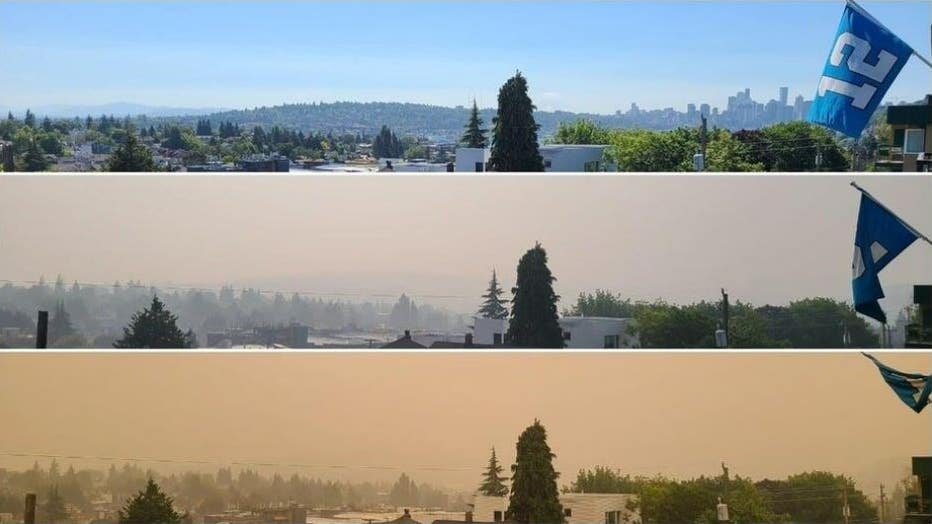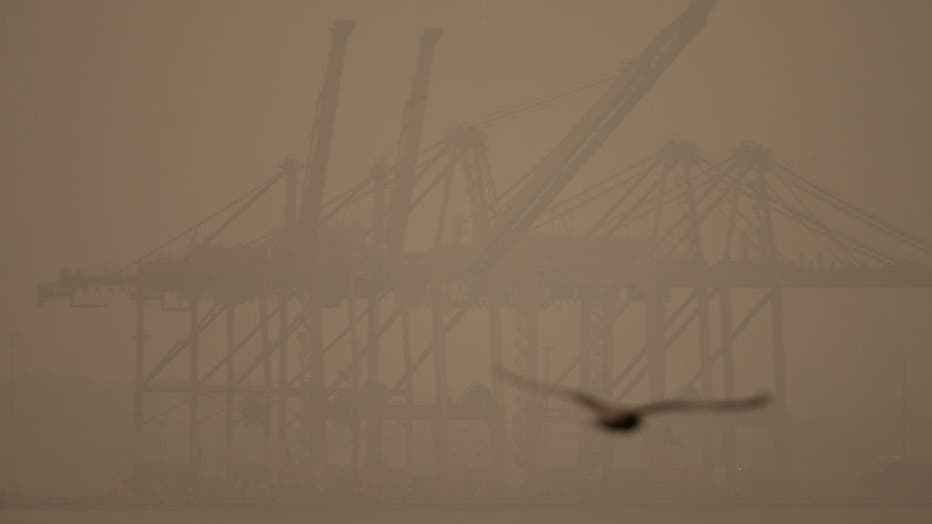Wildfire smoke health effects: How to protect yourself in WA
SEATTLE - Smoky sunshine lingers in Seattle this weekend, and the summer heat continues. Keeping your home cool while keeping the smoke out can be tricky, but health experts are here to help.
According to FOX 13 Meteorologist Abby Acone, high-level smoke will hover over the region this weekend. While most of the haze is in the high levels of the atmosphere, some of it is mixing towards the surface as well. For most backyards in Western Washington, we don't expect air quality to impact the health of the majority of the population. However, those with respiratory issues and other medical sensitives (e.g. those with asthma, COPD or COVID-19) could be affected.
When is the smoke in Seattle, WA expected to go away?
Air quality is expected to gradually improve late Sunday and Monday as winds from the west increase. This will push any haze out of our region (at least, in the short-term). While we're not sure exactly how air quality will fare during the rest of the work week, it seems likely that there will be far less haze after Monday compared to what we've seen the last couple of days.
UW Medicine Pulmonologist Dr. Cora Sack says people should plan ahead, rather than wait for the sky to turn hazy.
"Have a plan for what to do if the days get smoky. So really knowing where you can go to get safe air quality and what to do to prepare your home and maybe talk to your doctor as well about what to do if you're experiencing any health effects," says Dr. Sack.
How to prepare your home for wildfire smoke
There are various things you can do to help improve your home's air quality, aside from closing doors and windows. If you have central air conditioning, putting your air on recirculate and making sure you have a good quality filter will remove harmful particles from the air. UW Medicine Pulmonologist Dr. Cora Sack says, 'If you don't have central air, you can get a portable air filter. And I really recommend a HEPA filter that mechanically removes particles and doesn't generate ozone or other harmful byproducts.' She adds that you can also make your own filter at home by using a box fan and putting a filter on top of it.
The state Department of Ecology shows us how to DIY a box fan filter in this YouTube video to improve indoor air quality in a single room.
How to know if wildfire smoke has gotten into your home
If wildfire smoke enters your home, but it's not clearly visible, your body will tell you. It's common for particles in smoke to cause health effects like burning or itchy eyes, sore throat, headaches and nausea. UW Medicine Pulmonologist Dr. Cora Sack says if you are experiencing any of these symptoms, that should be a sign to stop what you're doing and try to get clean air.
If wildfire smoke has entered your home, do not fry or broil foods, vacuum, burn candles, or use a fireplace or wood stove. These activities will only add particles inside your home, according to AirNow.

2020 Labor Day Wildfires: Photo at Fremont overlooking Capitol Hill and South Lake Union with wildfire smoke. Top photo 'normal' Seattle day, middle photo is Friday, and bottom photo shows wildfire smoke conditions on Saturday. Photo credit: Kurt Ric
How to protect yourself from wildfire smoke
According to King County Health, the best way to protect yourself from wildfire smoke is to stay indoors and make sure the air quality in your home is clean. If you have to be outside, it's recommended to wear a tight-fitting N95 mask. People with asthma should keep an inhaler close by.
"I know we've all gotten very used to wearing masks [..] for protecting us against COVID transmission," says UW Medicine Pulmonologist Dr. Cora Sack. "Unfortunately, those cloth masks that we use for COVID aren't effective at filtering out the smallest particles that are dangerous from wildfire smoke. You can consider doing things like wearing a tight-fitting and N95 mask to help protect you. To be really effective, it needs to be again, fit tested. So, it fits your face appropriately and really can filter out the particles and has a tight seal."
How to protect dogs or pets from wildfire smoke
If wildfire smoke is present, keep your pets indoors as much as you can. If your animals experience any of the following signs, call your veterinarian:
- Coughing or gagging
- Red or watery eyes
- Nasal discharge
- Inflammation of the throat or mouth
- Reluctance to eat hard foods
- Fatigue or weakness
- Disorientation, uneven gait, stumbling
- Reduced appetite or thirst
According to AirNow, if it's smoky outside, don't take your pet out for a run or exercise. It's okay to let them outside for a bathroom break, but it is important to keep them indoors.

SEATTLE, WA - SEPTEMBER 12: A seagull flies past cranes on Harbor Island as smoke from wildfires fills the air on September 12, 2020 in Seattle, Washington. According to the National Weather Service, the air quality in Seattle remained at "unhealthy"
What are the short-term health effects of breathing wildfire smoke?
Inhaling wildfire smoke can have immediate effects such as coughing, shortness of breath, irregular heartbeat burning or itchy eyes, sore throat, headaches and sometimes nausea, according to UW Medicine Pulmonologist Dr. Cora Sack.
What are the long-term health effects of wildfire smoke?
According to the National Oceanic and Atmospheric Administration (NOAA), particles that make up wildfire smoke could cause cardiovascular disease, lung disease and premature mortality. Though research is sparse, there is increasing evidence that wildfire-related exposure was associated with an increased risk of death from cancer, according to Cancer Therapy Advisor. These types of cancer include nasopharyngeal cancer, esophageal cancer, stomach cancer, colorectal cancer, laryngeal cancer, skin cancer, breast cancer, prostate cancer and testicular cancer.
Who is at risk of breathing wildfire smoke?
"The groups that are most susceptible to the health effects of wildfire smoke include the elderly or those over the age of 65, people with underlying health conditions like lung or heart disease, pregnant women and infants," says UW Medicine Pulmonologist Dr. Cora Sack
"If you’re a sensitive population, you may experience more severe symptoms and health effects, and that could include difficulty breathing or chest pain. And that would be a sign that you should call your doctor or go to the emergency room to get evaluated."
MORE TOP HEADLINES FROM FOX 13:
Voter guide: What to know about the WA 2024 primary election
Workers at Seattle's Woodland Park Zoo prepare for possible strike
Woman killed in I-5 hit-and-run crash, WA troopers seek public's help
More in-person work days for Seattle executive branch employees soon
Pierce County deputies disrupt international cockfighting ring in Buckley, WA
Pioneer Fire now a quarter-mile from Stehekin, Level 3 Evacuations in place
To get the best local news, weather and sports in Seattle for free, sign up for the daily FOX 13 Seattle newsletter.

